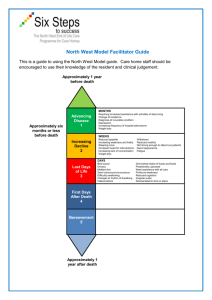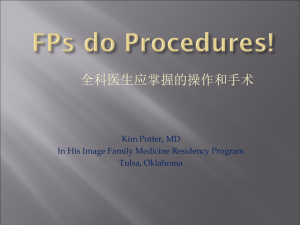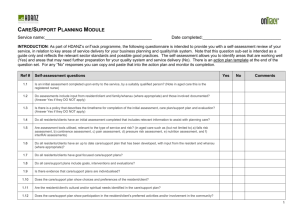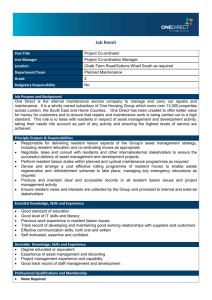Risks for Aspiration - Fort Hudson Health System
advertisement
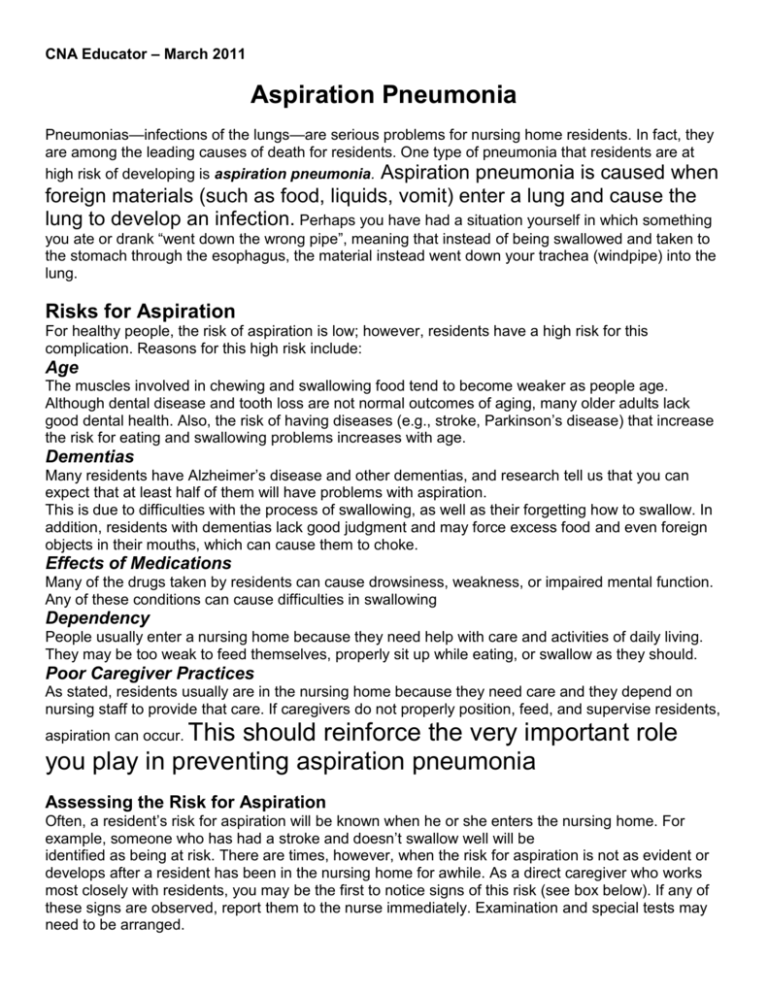
CNA Educator – March 2011 Aspiration Pneumonia Pneumonias—infections of the lungs—are serious problems for nursing home residents. In fact, they are among the leading causes of death for residents. One type of pneumonia that residents are at high risk of developing is aspiration pneumonia. Aspiration pneumonia is caused when foreign materials (such as food, liquids, vomit) enter a lung and cause the lung to develop an infection. Perhaps you have had a situation yourself in which something you ate or drank “went down the wrong pipe”, meaning that instead of being swallowed and taken to the stomach through the esophagus, the material instead went down your trachea (windpipe) into the lung. Risks for Aspiration For healthy people, the risk of aspiration is low; however, residents have a high risk for this complication. Reasons for this high risk include: Age The muscles involved in chewing and swallowing food tend to become weaker as people age. Although dental disease and tooth loss are not normal outcomes of aging, many older adults lack good dental health. Also, the risk of having diseases (e.g., stroke, Parkinson’s disease) that increase the risk for eating and swallowing problems increases with age. Dementias Many residents have Alzheimer’s disease and other dementias, and research tell us that you can expect that at least half of them will have problems with aspiration. This is due to difficulties with the process of swallowing, as well as their forgetting how to swallow. In addition, residents with dementias lack good judgment and may force excess food and even foreign objects in their mouths, which can cause them to choke. Effects of Medications Many of the drugs taken by residents can cause drowsiness, weakness, or impaired mental function. Any of these conditions can cause difficulties in swallowing Dependency People usually enter a nursing home because they need help with care and activities of daily living. They may be too weak to feed themselves, properly sit up while eating, or swallow as they should. Poor Caregiver Practices As stated, residents usually are in the nursing home because they need care and they depend on nursing staff to provide that care. If caregivers do not properly position, feed, and supervise residents, This should reinforce the very important role you play in preventing aspiration pneumonia aspiration can occur. Assessing the Risk for Aspiration Often, a resident’s risk for aspiration will be known when he or she enters the nursing home. For example, someone who has had a stroke and doesn’t swallow well will be identified as being at risk. There are times, however, when the risk for aspiration is not as evident or develops after a resident has been in the nursing home for awhile. As a direct caregiver who works most closely with residents, you may be the first to notice signs of this risk (see box below). If any of these signs are observed, report them to the nurse immediately. Examination and special tests may need to be arranged. Signs that there could be a high risk for aspiration include: • Coughing or choking while eating • Taking longer than in the past to eat and swallow • Having food collect in the mouth rather than being swallowed • Drowsiness or drifting off to sleep while eating • New or increased weakness • New or worsening decline in mental function Care-giving Tips To Prevent Aspiration Below, offers tips that you can use to reduce residents’ risk for aspiration. In addition to these basic measures, a therapist may recommend special actions to take with individual residents. Be sure to ask the nurse to review residents’ care plans with you so that you fully understand their individual care needs. Also, be sure you immediately report any choking or aspiration that you suspect. Hiding or ignoring the problem can lead to more serious complications for a resident. Your care-giving skills can not only help residents to have a high quality of life and care, but also, could spare them pain, the need for hospitalization, and even death! Tips for Preventing Aspiration Prepare and position the resident for eating • Offer and assist with oral hygiene • Position the resident in an upright position • Support the resident’s head so that it is kept straight, at the midline of the body • Use pillows to prop and support the resident’s body as needed • Keep the resident’s attention focused on eating Feed carefully • Be sure that the proper diet is being offered. Often, some foods are excluded and some preferred due to their ease in swallowing • Place 1/2 to 3/4 of a teaspoon of food in the mouth at a time • If one side of the resident’s mouth is weak (as from a stroke) turn the resident’s weaker side and place the food on the more functional side of the mouth • Ask the resident to exaggerate chewing motions • Feed slowly • Sometimes lemon-flavored Italian ice is ordered to be given before and during the feeding. The cold temperature and sour flavor stimulates the swallowing function and helps to clear the throat. Discuss this with the nurse. head toward the Guide the resident in good swallowing techniques • Instruct the resident to: • Hold the food in the mouth until told to swallow • Tuck her head down as though trying to touch the chin to the chest • Hold her breath • Swallow • Swallow again • Breathe normally • Cough after swallowing to clear food from the mouth that has not been swallowed • Check the resident’s mouth for food that may not have been swallowed. If any food is present, have the resident clear her mouth before continuing to eat. Allow the resident to remain in a sitting position for 45-60 minutes after eating Continue with post test and return to Staff Education for educational credit. __________________________________________________________________________ Name_______________________________ Date__________________ Aspiration Pneumonia Test Questions 1. Aspiration pneumonia most commonly occurs because the resident: A. Eats spoiled food B. Swallows food or fluid into the lungs rather than the stomach C. Is weakened by an infection that a visitor has brought in 2. The resident can swallow best when lying flat with the head and neck extended. A. True B. False 3. Resident Jones has had a stroke that causes her to have weakness on her right side of her body. When feeding her, you would want to place the food on which part of her tongue? A. Right side B. Left side C. Tip 4. Residents with dementias tend to have a low risk for aspiration. A. True B. False 5. A resident will be able to swallow easier if when swallowing she: A. Looks toward the ceiling B. Turns her head to the side C. Tucks her head downward 6. State one sign that could indicate a resident is at high risk for aspiration. __________________________




